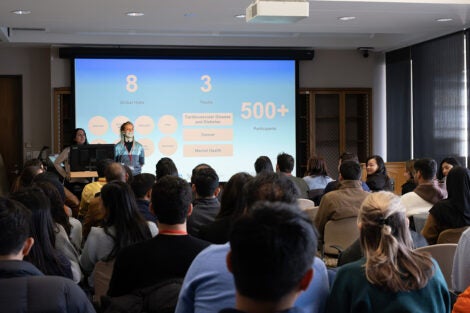April 16, 2024 – More than 500 people worldwide spent two intense days developing innovative ideas to tackle health care challenges at an early April hackathon organized by the Health Systems Innovation Lab (HSIL) at Harvard T.H. Chan School of Public Health.
The hackathon, held April 5-6, was aimed at fostering an environment in which participants could harness digital health—such as health-related apps and personalized medicine—and artificial intelligence (AI) to come up with solutions to help improve health care in one of three areas: cardiovascular disease and diabetes, cancer, and mental health. The event drew participants from more than 30 countries to a number of hubs around the world, including Boston; Buenos Aires, Argentina; Kyiv, Ukraine; Lima and other cities in Peru; London, UK; Santiago, Chile; and Sao Paulo, Brazil. Participants included students, postdocs, and young professionals.
The hackathon began with an opening panel moderated by Rifat Atun, professor of global health systems and HSIL director. The panelists shared insights on the latest trends in the use of AI and digital solutions in health care and how to scale up and sustain innovations in this arena.
Then the teams got to work. Throughout the event, teams were supported by both in-person and online mentors. On day two of the hackathon, teams pitched their ideas to panels of judges at each location, with one winner selected per track.
Diabetes, mental health innovations
Winners in the Boston hub, which hosted 70 participants at Countway Library, included a team in the cardiovascular disease and diabetes track that developed an idea called “SweetAudio,” a machine learning model that can analyze variables in the human voice, such as pitch or intensity, in order to estimate blood glucose levels. Team member Hein Thu, an MD slated to earn a master of public health in health management from Harvard Chan School in May, explained that blood glucose level can affect the elasticity of the larynx and vocal cords, and chronic diabetes can lead to muscle diseases and muscle weakness, which can in turn cause voice disorders. The SweetAudio model will be trained by matching variabilities in the voice with blood glucose levels, as measured by a continuous glucose monitor (CGM). Once the model has been fine-tuned, it should be able to analyze a person’s voice in just a few seconds and provide a blood glucose estimate. The plan is to provide a free version of SweetAudio for low-income populations that may not have access to CGMs or blood glucose test strips, Thu said.
Another winning team in the Boston hub, in the mental health track, proposed an AI bot called “Sam.io” to help mental health patients adhere to their medications through personalized follow-up care. Reasons for low adherence among mental health patients include poor health literacy, distrust of doctors, and medication side effects, according to team member Mariel Sander, a Harvard Medical School student. The Sam.io bot would be able to converse with patients over the phone and via text, as well as understand patient emotions from their voice and language, Sander said.
All the winning teams are invited to participate in a bootcamp in preparation for pitching their ideas to a global judging panel in early May. Winners of the global judging will be invited to join the HSIL’s six-month Venture Incubation Program (VIP) to further their innovations. Through VIP, the winners receive online help from academic and entrepreneurial partners in Brazil, Mexico, Colombia, Peru, and Saudi Arabia on how to fine-tune their ideas, present business proposals and make financial projections for their startups, and pitch their ideas to potential partners and investors.
Photos: Jonathan Gong




